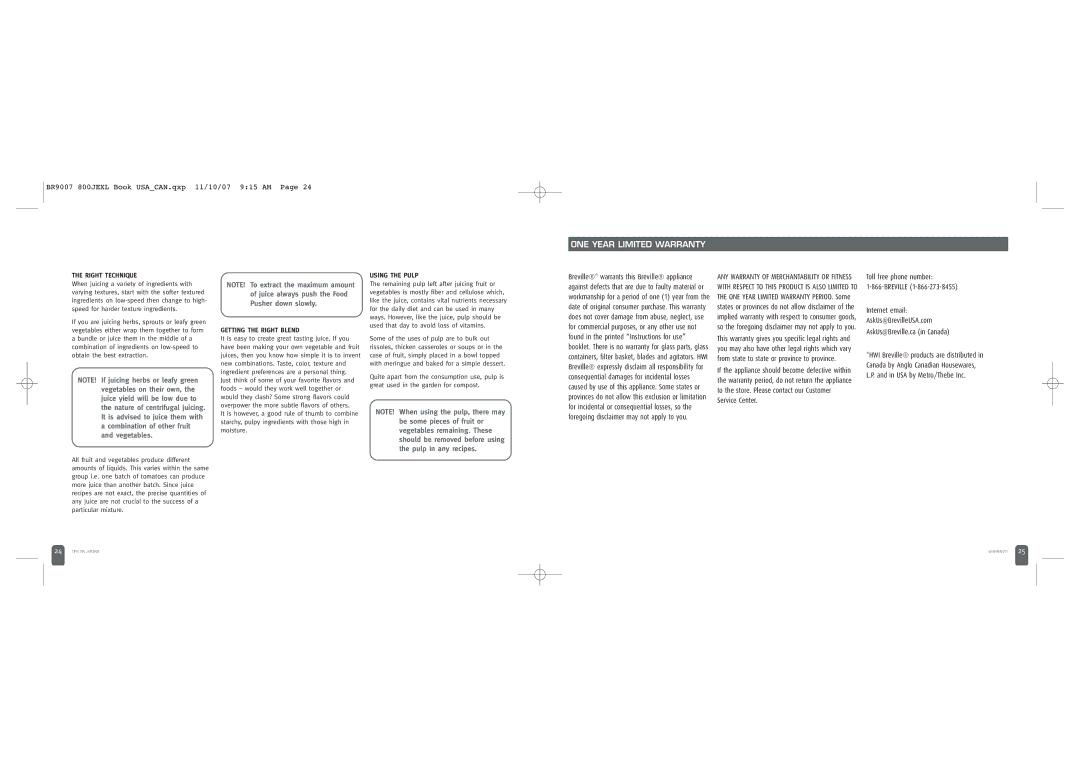
BR9007 800JEXL Book USA_CAN.qxp 11/10/07 9:15 AM Page 24
ONE YEAR LIMITED WARRANTY
THE RIGHT TECHNIQUE
When juicing a variety of ingredients with varying textures, start with the softer textured ingredients on
If you are juicing herbs, sprouts or leafy green vegetables either wrap them together to form a bundle or juice them in the middle of a combination of ingredients on
NOTE! If juicing herbs or leafy green vegetables on their own, the juice yield will be low due to the nature of centrifugal juicing. It is advised to juice them with a combination of other fruit and vegetables.
All fruit and vegetables produce different amounts of liquids. This varies within the same group i.e. one batch of tomatoes can produce more juice than another batch. Since juice recipes are not exact, the precise quantities of any juice are not crucial to the success of a particular mixture.
NOTE! To extract the maximum amount of juice always push the Food Pusher down slowly.
GETTING THE RIGHT BLEND
It is easy to create great tasting juice. If you have been making your own vegetable and fruit juices, then you know how simple it is to invent new combinations. Taste, color, texture and ingredient preferences are a personal thing.
Just think of some of your favorite flavors and foods – would they work well together or would they clash? Some strong flavors could overpower the more subtle flavors of others.
It is however, a good rule of thumb to combine starchy, pulpy ingredients with those high in moisture.
USING THE PULP
The remaining pulp left after juicing fruit or vegetables is mostly fiber and cellulose which, like the juice, contains vital nutrients necessary for the daily diet and can be used in many ways. However, like the juice, pulp should be used that day to avoid loss of vitamins.
Some of the uses of pulp are to bulk out rissoles, thicken casseroles or soups or in the case of fruit, simply placed in a bowl topped with meringue and baked for a simple dessert.
Quite apart from the consumption use, pulp is great used in the garden for compost.
NOTE! When using the pulp, there may be some pieces of fruit or vegetables remaining. These should be removed before using the pulp in any recipes.
Breville®* warrants this Breville® appliance against defects that are due to faulty material or workmanship for a period of one (1) year from the date of original consumer purchase. This warranty does not cover damage from abuse, neglect, use for commercial purposes, or any other use not found in the printed “Instructions for use” booklet. There is no warranty for glass parts, glass containers, filter basket, blades and agitators. HWI Breville® expressly disclaim all responsibility for consequential damages for incidental losses caused by use of this appliance. Some states or provinces do not allow this exclusion or limitation for incidental or consequential losses, so the foregoing disclaimer may not apply to you.
ANY WARRANTY OF MERCHANTABILITY OR FITNESS WITH RESPECT TO THIS PRODUCT IS ALSO LIMITED TO THE ONE YEAR LIMITED WARRANTY PERIOD. Some states or provinces do not allow disclaimer of the implied warranty with respect to consumer goods, so the foregoing disclaimer may not apply to you.
This warranty gives you specific legal rights and you may also have other legal rights which vary from state to state or province to province.
If the appliance should become defective within the warranty period, do not return the appliance to the store. Please contact our Customer Service Center.
Toll free phone number:
Internet email:
AskUs@BrevilleUSA.com
AskUs@Breville.ca (in Canada)
*HWI Breville® products are distributed in Canada by Anglo Canadian Housewares, L.P. and in USA by Metro/Thebe Inc.
24 TIPS ON JUICING
WARRANTY 25
